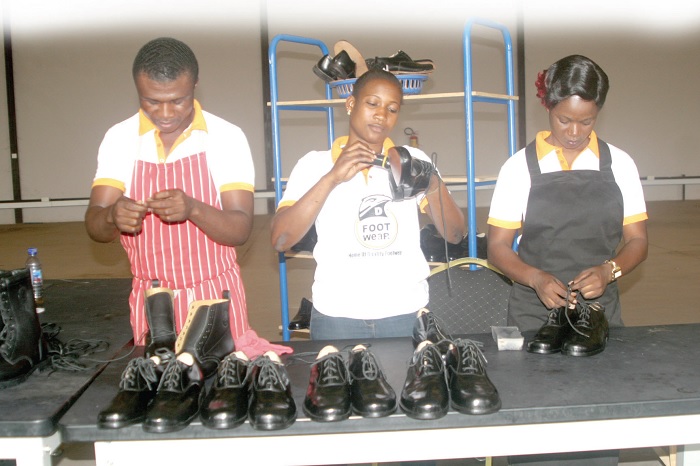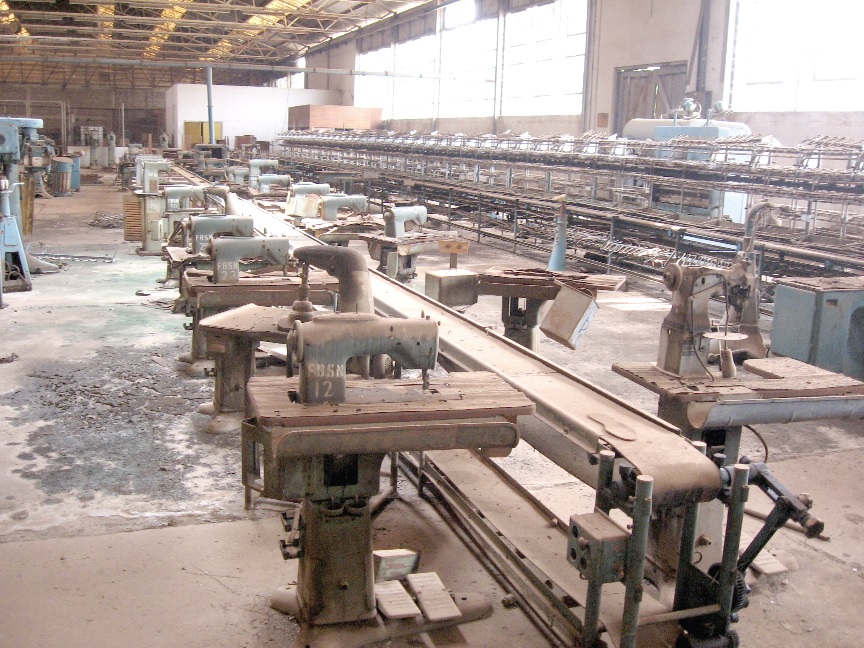Kumasi Shoe Factory comes alive
Arku Jasmine
 The long-cherished hope of some Ghanaians to see the resurgence of the once famous Kumasi Shoe Factory has materialised.
The long-cherished hope of some Ghanaians to see the resurgence of the once famous Kumasi Shoe Factory has materialised. Formerly called the Ghana Industrial Holding (GIHOC) Footwear Company Limited, the now Defence Industries Holding Company Limited (DIHOC) Footwear Division Limited, is producing shoes for the uniformed security agencies in the country.
Established in 1960, the shoe factory, located on a the 35.75-acre land produced footwear and rubber sheets under an agreement signed by Ghana’s first President, Dr Kwame Nkrumah, and Czechoslovakia in 1961, collapsed in the late 1970s.
It has been resuscitated, following a joint partnership between a Czech Republic-based company, Knights a.s., acting through its subsidiary, Knight Ghana Limited, and the Defence Industries Holding Company Limited (DIHOC), owned by the Ghana Armed Forces (GAF).
DIHOC Footwear now produces safety boots and shoes for private security and manufacturing companies, as well as sandals for schools.
Speaking to the Daily Graphic, the Chief Executive Officer of Knight Ghana Limited, Dr Karl Laryea, said even though the shoe factory was yet to officially receive orders from the security agencies, it had already started full production.
“Currently the company is supplying shoes to institutions that place orders for supplies. We have trained personnel who make the shoes,” he said.
Collapse of GIHOC
A former employee of the defunct GIHOC Footwear who is now the consultant to DIHOC Footwear Division Limited, Mr S.O. Lawson, said the problems of GIHOC Footwear started after the overthrow of Dr Kwame Nkrumah.
He said discontinuation of orders from the security forces, government interference in the day-to-day activities of the company; mismanagement of the company’s resources by both the leadership and workers and the company’s inability to access credit led to its collapse.
He also said since the government’s orders were irregular, the workforce of 1,500 was reduced to 140 in the late 1980s and the company was completely shut down in 2002, the total workforce had reduced to about 60.
Birth of DIHOC Footwear
After the factory collapsed in 2002, former President John Agyekum Kufuor’s administration made an unsuccessful attempt to revive it.
It was subsequently handed over to the Divestiture Implementation Committee (DIC) and some selected ministries to look for investors.
According to Mr Lawson, a Czech company won the bid to run the company again but it was unsuccessful because there was no commitment on the part of the authorities in terms of orders by the security agencies.

In 2009, Knight of Czech Republic, acting through its local subsidiary, Knight Ghana Limited, put in a bid through the DIC.
The company, Mr Lawson said, won the bid and following the military’s show of interest in the project, the DIC decided that DIHOC Holding and Knights Ghana Limited should form a company to run the factory, hence the name, DIHOC Footwear Division Limited.
State of the shoe factory
According to Mr Lawson, at the time of the takeover of the company by the new owners in 2009, the infrastructure and all machinery had broken down and had to be either rehabilitated or replaced.
He said new equipment was brought in from the Czech Republic and explained, “Since the factory was constructed by the Czech Republic, we deemed it necessary to bring experts from that country to fix the machines and also train the personnel who would operate the machines,” he said.
The factory has since trained over 200 workers but because of irregular orders, only one-third of them are currently working. At full capacity, the factory will have 800 workers and create an extra 200 jobs indirectly for distributors, when all the assembly lines are fixed and operating fully.
Meanwhile, Dr Laryea has cautioned that if the problems that caused the original GIHOC Footwear Company to collapse are not averted, a similar fate could befall DIHOC Footwear Division Limited.
“If government can ban the importation of used footwear into the country and direct government agencies and public schools to buy from the factory, then we can say that there is future for the factory,” Dr Laryea added.
By Dominic Moses Awiah/Daily Graphic/Ghana